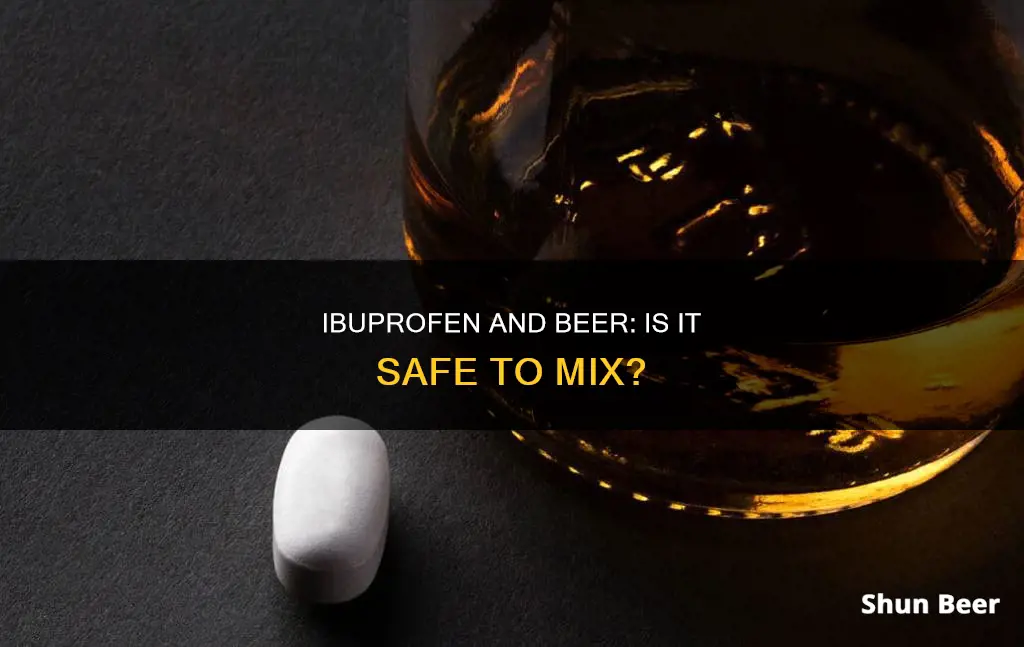
Drinking alcohol and taking ibuprofen can be a dangerous combination. Both irritate the stomach and digestive tract, increasing the risk of ulcers and bleeding. In addition, ibuprofen can affect the kidneys, and alcohol can cause dehydration, making it harder for the kidneys to filter toxins. Mixing the two can lead to more severe liver problems and kidney function issues, causing other significant health conditions like kidney disease or liver disease.
| Characteristics | Values |
|---|---|
| Is it safe to drink beer after taking 200 mg ibuprofen? | Generally, it is safe to drink a small amount of alcohol (one drink for women and two drinks for men per day) while taking 200 mg ibuprofen. |
| How long after drinking alcohol can you take ibuprofen? | It is recommended to wait at least 10 hours to 24 hours after drinking alcohol before taking ibuprofen. |
| How long after taking ibuprofen can you drink alcohol? | It is recommended to wait at least four to six hours after taking ibuprofen before consuming alcohol. |
| Risks of combining alcohol and ibuprofen | Increased risk of gastrointestinal bleeding, liver problems, kidney damage, cardiovascular problems, stroke, and decreased effectiveness of the medication. |
What You'll Learn

Gastrointestinal bleeding
A study of 1,224 participants showed that regular ibuprofen use raised the risk of gastrointestinal bleeding in people who consumed alcohol. People who drank alcohol but only used ibuprofen occasionally did not have this increased risk. The risk of gastrointestinal bleeding also increases with age and the use of other medications.
The symptoms of gastrointestinal bleeding include:
- Black or tarry stool
- Stomach pain or abdominal cramps
- Blood streaks in stool
- Vomit that looks like coffee grounds
- An upset stomach that doesn't go away
If you experience any of these symptoms, contact your healthcare provider immediately. To reduce the risk of gastrointestinal bleeding, it is recommended to wait at least 10 hours after consuming alcohol before taking ibuprofen, and to avoid excessive alcohol consumption.
Beer and Breakouts: Is Your Skin Safe?
You may want to see also

Kidney damage
Ibuprofen is a nonsteroidal anti-inflammatory drug (NSAID) that can be used to reduce pain, swelling, and fever. While it is available over the counter, it is a strong medication that can have harmful side effects if not taken correctly.
Combining alcohol and ibuprofen can increase the risk of kidney damage, especially in individuals with pre-existing conditions or those who consume excessive amounts of alcohol. Both alcohol and ibuprofen can irritate the stomach and digestive tract, increasing the risk of ulcers and bleeding from the digestive tract. Additionally, ibuprofen can affect kidney function by reducing blood flow to the kidneys, and alcohol can cause dehydration, making it harder for the kidneys to filter toxins.
People with underlying medical conditions, such as liver or kidney disease, high blood pressure, or heart failure, are most at risk of kidney damage from combining alcohol and ibuprofen. The risk of kidney damage is also higher for those taking higher doses of ibuprofen.
Symptoms of kidney damage include:
- Producing less urine or not urinating at all
- Swelling in the arms, legs, or feet
- Vomiting
- Metabolic acidosis
- Hypotension
- Hepatotoxicity
If you experience any of these symptoms while taking ibuprofen, it is important to contact your doctor right away.
Beer Headaches: Why It Happens and What to Do
You may want to see also

Liver problems
While drinking a small amount of alcohol while taking ibuprofen is usually safe, heavier drinking can increase the risk of liver problems. Both alcohol and ibuprofen irritate the stomach and digestive tract, and combining them further increases the risk of ulcers and bleeding from the digestive tract.
Ibuprofen can also affect the kidneys in some people with additional health issues, and alcohol, which can cause dehydration, can make this worse. Alcohol is processed in the liver, and heavy drinking can lead to inflammation and scarring of the liver (cirrhosis). Ibuprofen can also induce liver toxicity, and a study has shown that the combination of ibuprofen and alcohol can cause synergistic hepatotoxicity.
People with underlying medical conditions, such as liver or kidney disease, are most at risk of adverse effects from drinking alcohol while taking ibuprofen.
Concussion and Alcohol: A Risky Mix?
You may want to see also

Increased drowsiness
Ibuprofen and alcohol can both cause drowsiness. When combined, they may make this drowsiness worse, leading to excessive sleepiness or an inability to function normally. This increased drowsiness can lead to slower reaction times, impaired coordination, and difficulty concentrating.
The Centers for Disease Control and Prevention (CDC) state that it is never safe to drink alcohol and drive. Alcohol slows down reaction times and impairs coordination, and the addition of ibuprofen may further increase these effects.
If you are taking ibuprofen, it is essential to follow the recommended dosage and not exceed the suggested duration of use. Prolonged use of ibuprofen, especially in high doses, can increase the risk of experiencing side effects when combined with alcohol.
To minimize the risk of increased drowsiness, it is advisable to wait at least four to six hours after consuming alcohol before taking ibuprofen. If you are still feeling the effects of alcohol, it is best to wait until they have completely worn off before taking ibuprofen.
Additionally, certain individuals may be more susceptible to the effects of increased drowsiness. Older adults, for example, are at a higher risk of complications from mixing medication and alcohol due to their body's decreased ability to process alcohol with age.
Denver's Beer Laws: Drinking in Public Parks
You may want to see also

Cardiovascular problems
While consuming a small amount of alcohol while taking ibuprofen is usually not harmful, mixing the two can have adverse effects on cardiovascular health.
Ibuprofen is a nonsteroidal anti-inflammatory drug (NSAID) that is available over the counter and is used to relieve pain, swelling, and fever. NSAIDs are associated with an increased risk of impaired renal function, certain cardiovascular events (e.g. heart attack, stroke), and elevated blood pressure. The use of NSAIDs, excluding aspirin, is linked to a greater risk of heart attack and stroke, with the risk increasing the longer the NSAID is used.
Alcohol, on the other hand, can also raise blood pressure and damage the heart muscle. When combined with ibuprofen, alcohol can further increase the risk of cardiovascular problems. Additionally, NSAIDs can reduce blood flow to the kidneys, and alcohol can cause dehydration, making it harder for the kidneys to filter toxins. This combination can lead to kidney problems, especially in individuals with underlying health issues.
People with underlying medical conditions, such as liver or kidney disease, high blood pressure, or heart failure, are at the highest risk of cardiovascular problems when mixing ibuprofen and alcohol. Therefore, it is important to exercise caution and consult a doctor before consuming alcohol with ibuprofen, especially for those with pre-existing health conditions.
Beer Benefits for Hair: A Guide
You may want to see also
Frequently asked questions
It is generally considered safe to have a small amount of alcohol, such as one beer, while taking ibuprofen, as long as you are healthy and have no underlying medical conditions. However, it is important to note that combining alcohol and ibuprofen can increase the risk of side effects such as gastrointestinal bleeding, kidney damage, and liver problems.
It is recommended to wait at least 10 hours after taking ibuprofen before consuming alcohol, as it takes around that long for the ibuprofen to be cleared from your system.
It is advised to wait at least 24 hours after drinking beer before taking ibuprofen, as alcohol can stay in your system for about 24 hours or even longer in some individuals.
Combining ibuprofen and alcohol can increase the risk of gastrointestinal bleeding, kidney damage, liver problems, and other serious side effects. People with pre-existing medical conditions, such as liver or kidney disease, are at higher risk of experiencing these adverse effects.







